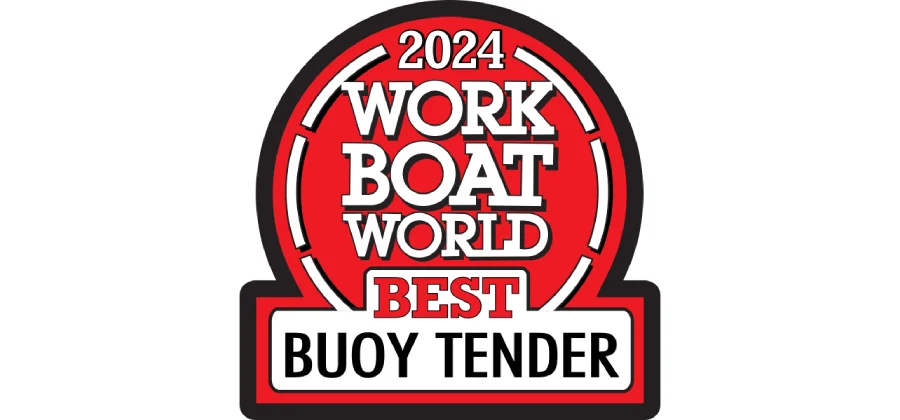AWARDS 2024 | Best Buoy Tender – BT Mazdoor – Med Marine
A very interesting multi-purpose heavy buoy tender and harbour work boat, BT Mazdoor was designed to operate in the often-rough conditions of the Arabian Sea off Pakistan.
Ruggedly built of steel and innovatively laid out to serve many purposes, the little ship is hyper-practical.
"BT Mazdoor stands out due to its tailored design and precision engineering, crafted to meet the specific operational needs of our client," Melis Ucuncu, Director of Business Development at Med Marine, told Baird Maritime.
"The primary objective was to ensure efficient handling and maintenance of open-water buoys in Pakistan while prioritising manoeuvrability and stability. To achieve this, we developed a meticulous design and production plan, aligning every detail with our client’s expectations."
Maintaining optimal stability was our top priority throughout the design and construction process.
She added that the delivery of the vessel was made possible partly through the collaborative approach shared with the client, which ensured optimal performance in real-world conditions.
The complexity of the vessel's design, particularly its arrangement and equipment, presented unique challenges for Med Marine. Ucuncu said, however, that the company's engineers ensured the smooth execution of the project.
"The most critical aspect was stability, given the vessel's large crane, which plays a central role in its operations. Maintaining optimal stability was our top priority throughout the design and construction process."
Ucuncu said the key knowhow gained from this project was understanding the effects of buoy vessel operation profiles on stability and detailed design. In her view, the insight will be crucial for optimising future vessels with similar operational needs.
"The shipbuilding industry is currently being shaped by a blend of regulatory pressure and market-driven trends," Ucuncu explained. "Sustainability remains at the forefront, with the IMO's goal of achieving net-zero emissions by 2050 and the EU’s 'green deal' pushing the sector to embrace green technologies, including hydrogen propulsion and more energy-efficient vessel designs.
"Digitalisation is also revolutionising the industry, with the integration of AI, robotics, and digital twins enhancing operational efficiency, especially in European shipyards that are leading the way in smart tech adoption."
Ucuncu said that, from a geopolitical perspective, China’s dominance in the global shipbuilding market, efforts by the US to revitalise its shipbuilding sector through the SHIPS Act, and Middle Eastern investments in maritime infrastructure, particularly in the UAE and Saudi Arabia, are intensifying competition.
She added that, at the same time, Africa’s emerging shipbuilding sector offers significant growth potential.
The current environment presents challenges related to workforce shortages and supply chain disruptions, requiring careful adaptation if one wishes to stay ahead.
"The evolving regulatory landscape, driven by the IMO’s sulphur and carbon emissions regulations and the EU’s increasingly stringent emissions standards, is spurring innovation across the industry," Ucuncu told Baird Maritime.
"However, these advancements come with added costs, particularly for shipbuilders in the EMEA region who must balance compliance with economic sustainability. The current environment also presents challenges related to workforce shortages and supply chain disruptions, requiring careful adaptation if one wishes to stay ahead."
The previous year was a productive one for Med Marine as the company continued to deliver new vessels with each one tailored to meet the unique needs of customers worldwide.
"Our collaborations with clients have not only strengthened our capabilities but also enhanced the way we serve their needs," said Ucuncu. "We are motivated to continue contributing to the global shipbuilding industry."
Ucuncu anticipates that the demand for various workboat types, particularly tugs, will continue to rise in the next few years.
"This growth is driven by a number of factors, including shifting global trade routes, the development of new ports, the increasing size of ships, and evolving maritime operations and management practices. Therefore, we expect the demand for reliable and efficient workboats to increase steadily."
Ucuncu believes the Turkish workboat industry will also experience growth driven by several key trends.
"There will be a strong focus on sustainability, with an emphasis on eco-friendly vessels, alternative fuels, and hybrid propulsion systems to reduce environmental impact," she told Baird Maritime. "Automation and digitalisation will also play a significant role, with the rise of autonomous workboats, IoT, and smart technologies to improve efficiency, maintenance, and safety."
"Additionally, Türkiye's strategic location will enhance its role as a maritime hub, creating opportunities to export workboats to emerging markets."
Ucuncu explained that the country maintains the highest standards in shipbuilding, constantly refining and enhancing these to ensure vessels not only meet but surpass global expectations.
"As these advancements shape the industry, Turkish shipbuilders will need to adapt quickly by integrating innovative solutions, enhancing production capabilities, and aligning with global sustainability goals to remain competitive in the international market."
For a list of the 2024 "Best Of" award winners, please click here.

